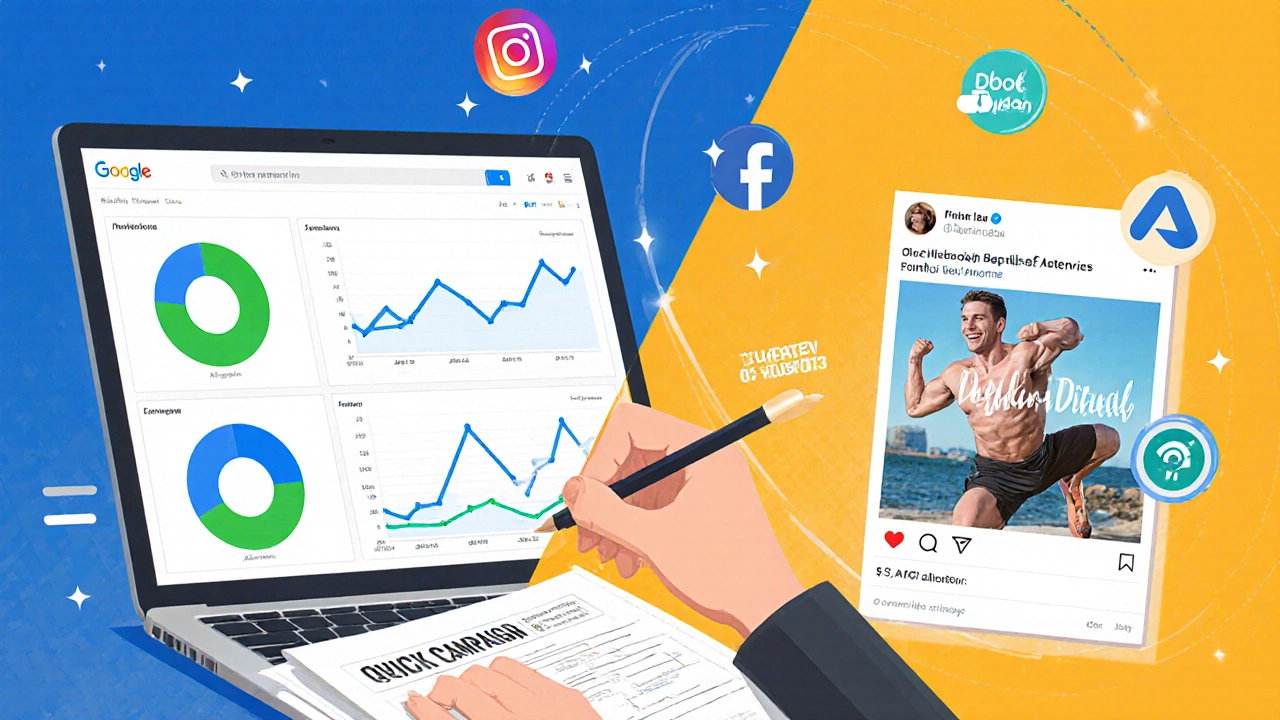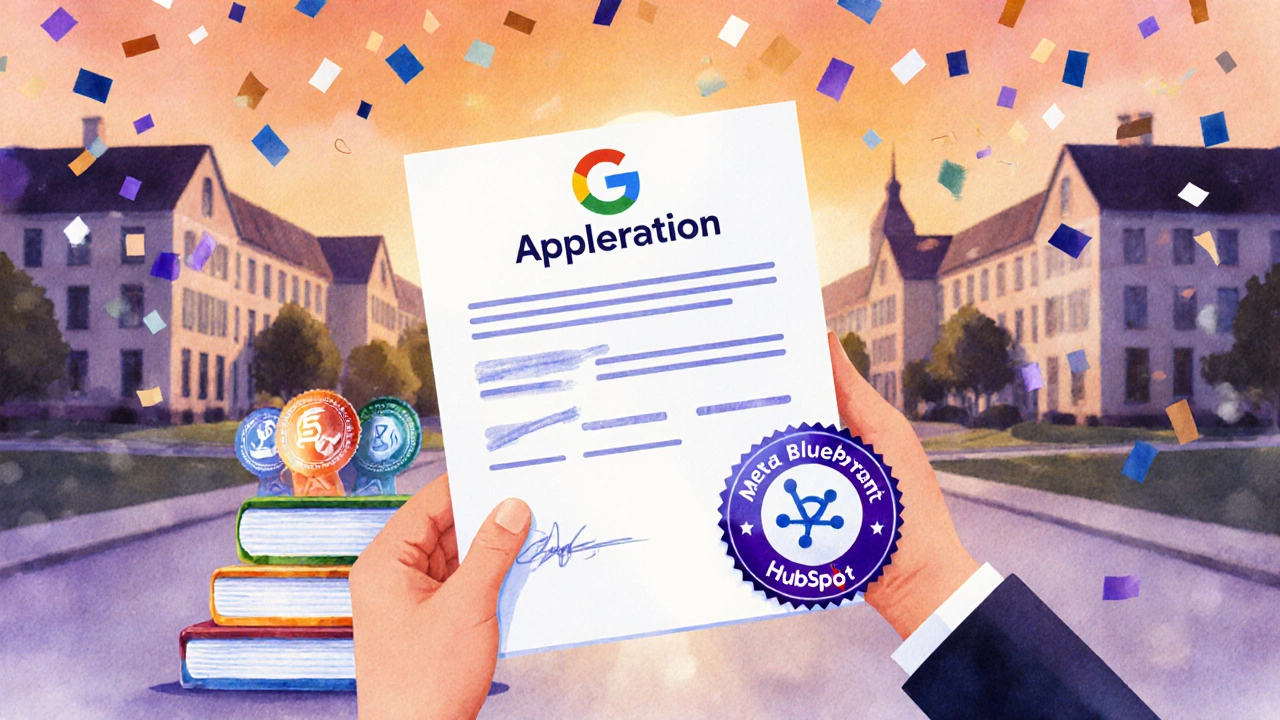Digital Marketing Course Qualification Checker
Check your qualification status
This tool assesses your readiness for accredited digital marketing courses based on the latest industry standards.
Key Takeaways
- Most reputable digital marketing courses expect basic computer literacy, a grasp of core marketing concepts, and a willingness to learn analytics tools.
- Build a mini‑portfolio (blog, social posts, ad mock‑ups) before you apply - it shows practical readiness.
- Certification isn’t mandatory, but a recognised badge (Google Analytics, Meta Blueprint) boosts acceptance odds.
- Self‑study routes can satisfy prerequisites if you document your learning with certificates or project screenshots.
- Common roadblocks are vague career goals and ignoring data‑driven results; set clear objectives and track outcomes.
So you’re wondering digital marketing qualification - what exactly you need to get into a solid program? The short answer: a mix of mindset, baseline skills, and evidence you can apply them. Below we break down every piece of the puzzle, from the mindset you should adopt to the exact credentials schools look for.
What “qualify” really means in the digital marketing world
When course providers say “qualify”, they’re not asking for a degree in advertising. They want to see that you can keep up with fast‑changing platforms, understand the basics of how people buy online, and can turn data into actions. In other words, they’re looking for three things:
- Foundational knowledge - concepts like the buyer’s journey, SEO fundamentals, and content strategy.
- Technical fluency - the ability to navigate at least one analytics or advertising tool.
- Proof of practice - a portfolio, case study, or certification that proves you’ve applied the knowledge.
Meeting these three pillars usually unlocks a spot in most accredited digital marketing courses.
Core skills every aspiring digital marketer needs
Below are the six skill‑areas that most providers list as prerequisites. The first time each term appears, we tag it with schema.org microdata so search engines recognize the entities.
Search Engine Optimization (SEO) is the practice of improving a website’s visibility in organic search results. Key metrics include keyword rankings, click‑through rate, and backlinks.
Content Marketing involves creating and distributing valuable, relevant content to attract and retain a clearly defined audience. Success is measured by engagement, time on page, and lead generation.
Social Media Marketing leverages platforms like Facebook, Instagram, LinkedIn, and TikTok to build brand awareness and drive conversions. Core KPIs are reach, impressions, and engagement rate.
Email Marketing uses targeted email campaigns to nurture leads and retain customers. Open rate, click‑through rate, and conversion rate are the main performance indicators.
Pay‑Per‑Click (PPC) Advertising is a paid traffic model where advertisers pay each time a user clicks their ad. Platforms include Google Ads and Bing Ads, with metrics like Cost‑Per‑Click (CPC) and Return on Ad Spend (ROAS).
Google Analytics is the industry‑standard web analytics tool that tracks visitor behavior, conversion paths, and traffic sources. Mastery of basic reports and custom dashboards is expected.

Formal education vs. self‑study: which path satisfies most programmes?
Most providers accept both routes, but they weigh them differently.
- University‑level diplomas or associate degrees give you a recognised academic credential. They’re handy if you’re applying to a university‑partnered bootcamp.
- Online bootcamps (e.g., General Assembly, BrainStation) often bundle live instruction with portfolio projects, which many schools treat as equivalent to a traditional degree.
- Self‑study using free resources (Google’s Digital Garage, HubSpot Academy) is perfectly valid as long as you earn certificates and can showcase results.
Bottom line: any route works if you can prove skill mastery through certificates, projects, or measurable outcomes.
Typical prerequisites for accredited digital marketing courses
Here’s a quick checklist most schools share on their admissions pages:
- Basic computer literacy - comfortable using browsers, spreadsheets, and word processors.
- English proficiency - most courses run in English, and you’ll need to write copy and reports.
- Foundational marketing knowledge - either a short intro course, a marketing‑related degree, or a self‑study module.
- One or two analytics or ad‑platform certifications (Google Analytics Individual Qualification, Meta Blueprint, HubSpot Inbound).
- A portfolio of at least one project - could be a blog, a social media campaign you ran for a local business, or a mock Google Ads account.
If you’re missing any of these, don’t panic. Each gap can be filled in a matter of weeks with targeted online courses.
How to build a portfolio that proves you’re ready
Admissions teams love concrete evidence. Follow these three steps to create a compelling showcase.
- Pick a niche you care about. Whether it’s fitness, sustainable fashion, or local events, a focused niche lets you show strategic thinking.
- Run a small campaign. Use a free ad credit (Google Ads offers $100 for new accounts) and track results in Google Analytics. Document the brief, target audience, ad copy, budget, and outcome.
- Publish a case study. Write a 500‑word post that outlines the problem, the strategy, the tools you used, and the results (CTR, CPA, conversion lift). Include screenshots.
When you submit your application, attach the case study PDF and a link to the live project. This instantly upgrades you from ‘interested’ to ‘ready.’

Certification options and how they fit into qualification
Below is a comparison table showing the most recognised certificates, their typical cost, and the weight they carry with course providers.
| Certificate | Provider | Cost (USD) | Typical Validity | Admission Value |
|---|---|---|---|---|
| Google Analytics Individual Qualification | Free | Perpetual (updates required) | High - proves data‑driven capability | |
| Meta Blueprint Certification | Meta | Free (exam fee $149 optional) | 2 years | Medium - shows social ad expertise |
| HubSpot Inbound Marketing Certification | HubSpot | Free | Perpetual | Medium - covers content and lead nurturing |
| Google Ads Search Certification | Free | Perpetual | High - essential for PPC‑focused programs | |
| Facebook Certified Marketing Science Professional | Meta | $299 | 2 years | Low‑Medium - niche but adds depth |
Getting any two of the above usually satisfies the certification prerequisite for most reputable courses.
Common pitfalls and how to avoid them
- Ignoring data. Many newbies focus on creative ideas but can’t prove ROI. Always tie every campaign to measurable KPIs.
- Applying without a clear goal. Admissions panels ask, “What do you want to achieve as a digital marketer?” Have a concise answer (e.g., “I aim to drive 30% revenue growth for e‑commerce brands within two years”).
- Relying on a single platform. Showing competence in only Facebook or only SEO looks narrow. Diversify your skill set across at least two channels.
- Skipping the portfolio. Your resume alone isn’t enough. Even a one‑page PDF with screenshots can make a difference.
- Overlooking soft skills. Communication, project management, and critical thinking are evaluated in interviews. Highlight examples where you led a team or presented findings.
Mini‑FAQ - your quick answers
Do I need a university degree to join a digital marketing course?
No. Most reputable programs accept candidates with a high‑school diploma plus the skill proof outlined above. A degree can help but isn’t mandatory.
How many certifications should I have before applying?
Two solid certificates (e.g., Google Analytics + Meta Blueprint) are enough to satisfy most admission criteria.
Can I use free resources to build my portfolio?
Absolutely. Platforms like Google Digital Garage, HubSpot Academy, and Facebook Business Suite let you run real‑world campaigns on a limited budget.
What’s the average cost of a recognized digital marketing certificate?
Most core certifications are free (Google, HubSpot). Paid options range from $100‑$300, often worth the investment for admissions.
How long does it take to become “qualified”?
If you start from scratch, 3‑4 months of focused learning plus a small project can meet most program requirements.
Ready to take the next step? Review the checklist, gather your certificates, and start building that portfolio. Once you’ve ticked the boxes, applying for a digital marketing course becomes a straightforward form‑fill rather than a gamble.
